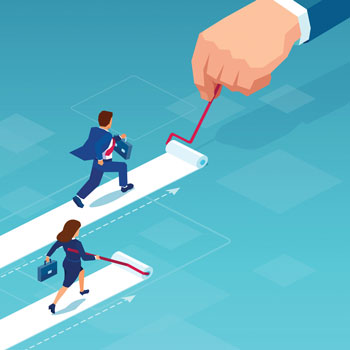Being a male ally of women in the workplace
Two physicians discuss identifying microaggressions and learning how to speak up.
Working in medicine means dealing with difficult situations, not only clinically but interpersonally.
“You see interactions almost every day that are less than ideal,” said Erik Wallace, MD, FACP, senior medical director for Colorado for Oak Street Health, a primary care network. Clinicians working with members of marginalized groups are often present when indirect, subtle, unintentional, or even downright discriminatory episodes occur, he noted.
“Most of my experiences that I've witnessed have been more along the lines of microaggressions in relation to race, ethnicity, gender, and sexual orientation. … You're often going to be a witness or a bystander to those types of interactions that are going to be hurtful to some people,” Dr. Wallace said. “The question is, can you identify those? And are you going to simply let it go, or are you going to be an upstander and ally in those instances?”
To help some of its members make the latter choice, ACP offered a paid sponsorship to attend the Women in Medicine Summit Inclusive Leadership Development Lab, which teaches male leaders in health care how to use allyship skills to support women in the workplace, in 2021. “I recognized that as good as I think I'm doing in regards to being inclusive and equitable in the work that I do, I can always do better,” Dr. Wallace said.
The opportunity to do so arrived when ACP chose him and Ricardo Correa, MD, FACP, for the sponsored lab education. Dr. Correa, who is program director for the endocrinology fellowship and director for diversity in graduate medical education at the University of Arizona College of Medicine in Phoenix, and Dr. Wallace spoke with ACP Internist about what they learned.
Q: What interested you in this opportunity?
A: Dr. Wallace: The majority of my team is made up of women, and then the majority of the medical students that are rotating through our particular location are also women. I thought it was a great opportunity to improve my skills so that I can be a better male advocate for women.
Dr. Correa: Because I was involved in the Diversity, Equity, and Inclusion (DEI) Committee of ACP, I looked at the communication and said, “I'm doing a lot of DEI work in my job. I want to learn more on how can I be better? How can I decrease the gap in gender parity? This will be a perfect opportunity.”
Q: How would you describe your beliefs and practices regarding allyship before this training?
A: Dr. Correa: I'm Latino, so I'm a minority, and I know how minorities feel in medicine and what are the struggles that we have. But the struggles that every minority feels are different. Also in my area, endocrinology, the majority of endocrinologists are women, but they are not the ones that are leading, chief of the division or leading programs, directors, or things like that.
So I knew a little bit that there was a gap in gender but didn't know the nitty gritty of how can I be a helper and how can I realize that certain comments, looking back, that were made in meetings and things were not appropriate. We focus always on … very outrageous comments. You notice them very easily. But … there are minimal comments that if you don't catch it, you will not understand that that's uncomfortable for that person.
Dr. Wallace: I was [familiar with male allyship] from a personal level, and given that I have three daughters, I always thought my role as their father is to be an advocate for them to be strong women in a society where there's a lot of bias against women. But recognizing in the workplace, I might do some things well, but I really need to improve my skills to do better in several situations. ... This program helped me understand a lot of those subtle things that I wasn't aware of.
Q: What were your main takeaways from the program?
A: Dr. Wallace: One thing they emphasized is to make sure you identify a woman that you work with who is willing to meet with you, willing to give you honest feedback, and isn't afraid to approach you with any issues that might come up that could be of concern. And I had identified that person, pretty strongly, who I felt like is always very open and honest with me, is going to tell me things that I might not like to hear. But there are things that I need to hear to recognize that something I said or the way I may have verbally or nonverbally responded could have been taken in a way that I may not have intended. And you only get that when you develop a trusting relationship. So for someone else to be able to give me that feedback, they first need to know that I want that feedback. Giving that feedback to me, it's going to be safe—meaning they're not going to get in trouble or feel intimidated.
Dr. Correa: It was an eye opener. You don't know how much money your colleague who is female is earning compared to you, because nobody asked how much money they were earning, but there are certain times that you can ask this, and then you realize that the female counterpart is getting less money. Or the chair comes and … they select the same person for a committee, and it's not a woman. I assumed sometimes that it was because the chair trusts [the selected person] more than the other person, but then you don't give the opportunity to the females, just because of the culture for many, many years.
Q: How have you implemented your learnings into your practice?
A: Dr. Correa: Something that even prior to the course I started doing, then I understood I was doing the correct thing, is that my associate program director is a female, and pushing her forward in everything that I do and involving her in every committee that I get. That was the correct thing I was doing because of seeing the value of her and her qualifications. But then I realized that as an ally, that's what it means. It means that when you have some kind of power, you can use that power to transform others. … I realized with this workshop that I need to be more aware, and then be more conscious of doing it—not just for one person, but for everybody.
Dr. Wallace: I do a lot of this training, and I always admit during these sessions, “I've been teaching this for years, but I don't feel like I'm perfect at this by any means.” There are situations that I feel very uncomfortable about what I should do next, because it's not clear. … I don't quite know what to say, I don't know exactly when to say it or exactly who to go to. But I have to process that. I have to consult with someone else. I have to gather information so that I know what the best possible response is going to be, the right time, the right person, the right situation. But we're getting to a point in society where if you don't respond to it, then in essence, you're endorsing what just happened. And that's not OK.
Q: Who would you recommend take a course like this?
A: Dr. Correa: Leaders—like chief of the division, chair of the department, deans—to make them understand, because sometimes this older generation didn't have the chance of having this [training]. But of course, we have to balance with the younger generation; for example, in my case, I also didn't have the training until this program.
Dr. Wallace: Often, when I'm in these sessions, I feel like the people who need to be here the most are not in attendance. I think the only way you're going to really improve these types of interactions is if this is standard training, very early on in the process of becoming a physician or other type of health care professional.
Q: What is your advice for other male physicians regarding allyship?
A: Dr. Correa: My advice is always be alert on things that happen in meetings and comments that can happen at every level. For example, “Now we have a new attending who is pregnant, and she will go for four months because she will take vacation to take care of the kid.” It's not a vacation. In that moment, you need to raise your hand and your voice and say, “That comment was not correct.” I think that waiting till the end, because you're a little bit afraid of what will happen, is not the way to do it. I think that the way to do it would be in the same moment, so then that person can realize they made a comment that was not appropriate.
Dr. Wallace: Oftentimes, we may not speak up as an ally because we don't want to be the dominant person in that discussion. So for example, let's say a female colleague is on the receiving end of a sexist comment or action, and you were witness to that. As a man, you might feel like, “Well, I don't want to step on the toes of the woman who is on the receiving end; I want to give her the chance to respond and not be the one who's speaking for her.” But you also have to recognize the time when someone is so hurt and disempowered by what just happened that they're not able to respond in that moment, because they're overwhelmed by that occurrence and they're looking for someone to step up and be an advocate for them in what just happened. It helps when you know those people really well and to know that that person would want you to say something. … And if you do it in the moment, there's risk involved with that. But there's a lot of potential reward as well, in terms of making sure that maybe that won't happen again.




